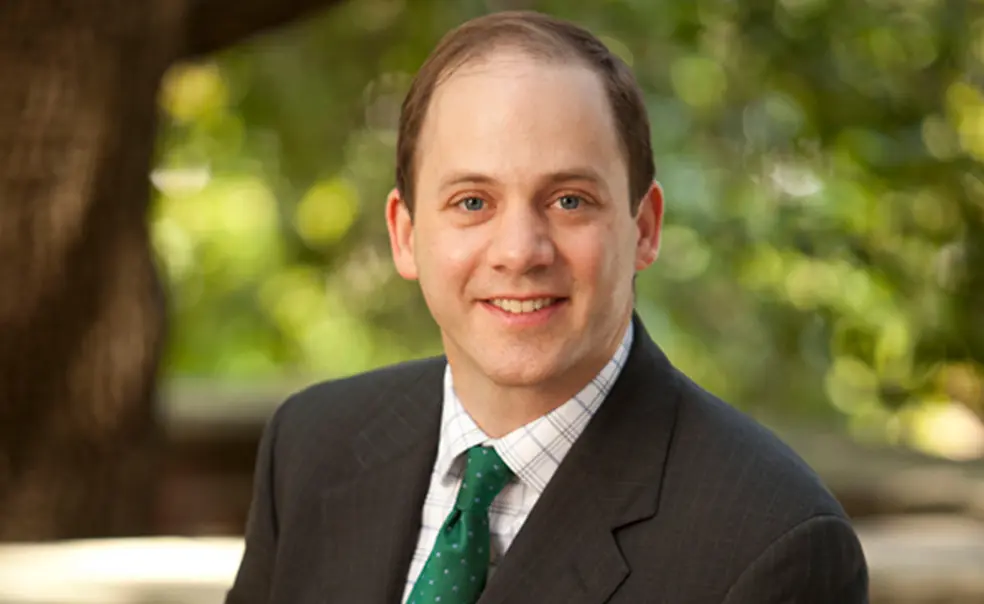Robert Mikos ’95 Explores Federalism (and More) Through Marijuana Law
When students enter Vanderbilt Law School professor Robert Mikos ’95’s course on marijuana law and policy, they quickly learn that in addition to digging into the title topic, they’ll be learning about a range of related issues, including federalism, race relations and equal protection, contract law, and tax law.
“I’m up-front with them about that,” Mikos said. “I tell them at the start, ‘It’s like sneaking vegetables into a cupcake for a child.’ But they don’t mind because they find it so interesting.”
Mikos is in the same camp: He didn’t intend to be one of the nation’s leading experts in marijuana law, but he found it so interesting that he couldn’t give it up. Last year, he published the first casebook on the subject, Marijuana Law, Policy, and Authority. He writes amicus briefs for marijuana law cases and gives expert testimony before state legislatures, bar associations, and attorneys general. And he’s helping to expose the next generation of lawyers to the important questions raised by a system that often puts state law in direct opposition to federal regulations.
“There’s a real need for informed legal advice in this field because there are so many legal issues that arise around people who use the drug, or who produce and distribute the drug, but also the people who deal with them — the physicians who recommend it to patients, the lawyers who advise these state-licensed suppliers, and so on,” Mikos said.
The lessons learned from marijuana policy, he added, can inform the way we think about other areas in which the federal government and the states have been at odds, such as immigration (with local “sanctuary city” statutes) and sports gambling (recently in the headlines because of the Supreme Court’s Murphy v. NCAA decision).
The first marijuana law case that drew Mikos’ eye was Gonzales v. Raich, a dispute about medical marijuana in California that landed in the U.S. Supreme Court in 2004. Even after the court’s decision, delivered in June 2005, upheld federal authority, states continued to pass medical and recreational marijuana laws (a recent tally from Governing reports that 30 states and the District of Columbia have legalized the drug in some form). Mikos, who was teaching in California at the time, noticed an immediate disconnect between the court ruling and the situation on the ground, where medical marijuana dispensaries were proliferating.
Mikos’ deep dive into marijuana law stems from a broader interest in federalism and the relationship between the states and the federal government. When he was a senior at Princeton, an arsonist burned his father’s furniture store in Iowa. The man responsible for the fire was prosecuted under state law and, after serving his sentence, the man committed arson again, this time burning a church. For the second crime, Mikos said, the federal government prosecuted the man, and he received a much longer sentence. Mikos wondered why federal prosecutors hadn’t taken on the first case, which seemed to fit within the government’s powers to protect interstate commerce. He was curious about how prosecutors weighed these choices.
As a law student at the University of Michigan, Mikos studied federalism and other subjects under professor Evan Caminker (later the dean of the law school at Michigan). The law school experience was filled with intellectual engagement, Mikos said, and he soon began rethinking his plans to be a prosecutor. He started considering a life in academia instead. Mikos taught at Michigan, the University of California, Davis, and Notre Dame before joining the Vanderbilt faculty in 2008.
Twelve years ago, Mikos would not have expected that following one case would eventually lead to an entire book about marijuana law and policy, but he’s glad that he pursued the questions that piqued that initial interest.
“You never know where your career is going to take you,” he said. “You just have to keep your eyes open for opportunities like this … and follow them, even if they don’t quite fit with what you thought your plans were going to be.”












1 Response
Norman Ravitch *62
7 Years AgoMore History, Not More Legalism
Lawyers will enjoy discussing whether states, communities, or the federal government should have primary jurisdiction over marijuana laws in particular or over social issues in general. But as a non-lawyer I look elsewhere. I look to the question: Is our society a society for the moral upbringing of our people, or is it a society for the freedom of the individual? In other words, are we followers of Locke or of Plato? Not what you expect, I suspect.
A society seeking to inculcate morality cannot be liberal. A liberal society cannot really have a moral purpose. A society seeking morality as a goal also cannot put individual freedom above everything else; it would put what is good above everything else. All our disputes over social issues have to take this into account, whether it be abortion, contraception, education, or socioeconomic policy. I doubt many are willing to do this. It can be painful; it certainly is not what people seeking their own freedom want to think about. But, please DO THINK ABOUT IT.